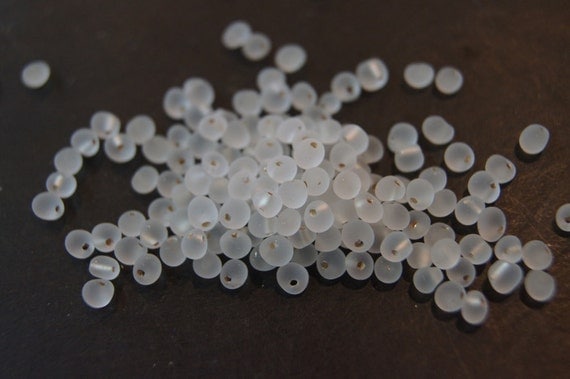At least it is in down under the down under.
If you happen to be enjoying the beautiful weather on a beach, I'd like you to keep an eye out for mermaid's tears.
That may sound like a cryptic ingredient out of some sort of fantasy movie,
But mermaids tears, AKA Nurdles (hahahaha, nurdles) are real round balls of plastic that are about 1/4 of the size of your pinky nail.
And are no laughing matter.
And are no laughing matter.
 (http://www.aphotomarine.com/images/strandline/plastic_nurdles_mermaids_tears_06-08-13_2.jpg)
(http://www.aphotomarine.com/images/strandline/plastic_nurdles_mermaids_tears_06-08-13_2.jpg)
Mermaid's tears can be found on practically every beach in the world. They are shipped across the world so that they can be melted down to form bigger pieces of plastic, as well as being used for packaging other items, in the way that polystyrene balls do.
So, no big deal right? They're only small beads...
That look really similar to fish eggs.
 https://img1.etsystatic.com/000/0/5448784/il_570xN.320595577.jpg
https://img1.etsystatic.com/000/0/5448784/il_570xN.320595577.jpg
Fish eggs are consumed by numerous species of marine animals, as they are rich in nutrients.
Mermaid's tears do not biodegrade, or break down, because it is made of plastic*. In this way, the mermaid's tears can accumulate within the digestive system of marine animals, eventually poisoning them.
So, keep an eye out for these tears, pick them up if you can, and tell other people about them.
 Disclaimer: Mermaid's Tears are not made by mermaids, but by the human race. It is unfair that we blame the pollution of the ocean on mermaids.
Disclaimer: Mermaid's Tears are not made by mermaids, but by the human race. It is unfair that we blame the pollution of the ocean on mermaids.
Thanks for reading,
Grace
*This is because of the type of bonding that occurs between the monomers of polypropene or polyethene, The monomers are made up of carbon and hydrogen atoms. Due to the long carbon chain length of polymers (which are comprised of many monomers joined together in a large chain), a lot of energy is required to break the bonds, as the long carbon chain length means that the forces of attraction between the monomers is very strong. Thus, plastic does not biodegrade easily as the sun's energy is not enough to separate the monomers.
If you wish to know more about the subject, I suggest Google, or taking chemistry.
Mermaid's tears do not biodegrade, or break down, because it is made of plastic*. In this way, the mermaid's tears can accumulate within the digestive system of marine animals, eventually poisoning them.
So, keep an eye out for these tears, pick them up if you can, and tell other people about them.
 Disclaimer: Mermaid's Tears are not made by mermaids, but by the human race. It is unfair that we blame the pollution of the ocean on mermaids.
Disclaimer: Mermaid's Tears are not made by mermaids, but by the human race. It is unfair that we blame the pollution of the ocean on mermaids.Thanks for reading,
Grace
*This is because of the type of bonding that occurs between the monomers of polypropene or polyethene, The monomers are made up of carbon and hydrogen atoms. Due to the long carbon chain length of polymers (which are comprised of many monomers joined together in a large chain), a lot of energy is required to break the bonds, as the long carbon chain length means that the forces of attraction between the monomers is very strong. Thus, plastic does not biodegrade easily as the sun's energy is not enough to separate the monomers.
If you wish to know more about the subject, I suggest Google, or taking chemistry.




